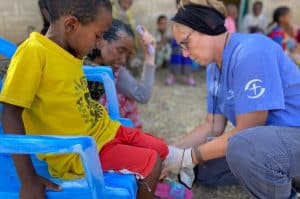


The weight of the humanitarian crisis in Tigray is palpable, but it’s rarely in the news—even as urban areas in northern Ethiopia swell with traumatized families living in schools and tarp shelters.
Samaritan’s Purse has been working in this region since February providing emergency food, cooking kits, and other relief. More than 135 tons of aid have been airlifted aboard our DC-8.
Samaritan’s Purse Canada has deployed 15 members of the Canadian Disaster Assistance Response Team (DART) to serve in this response.
Recently our teams have started constructing temporary shelters for families displaced by violent conflict—with more than 400 completed and hundreds more under construction. Now we’re also providing medical care in this area where clinics and hospitals are overwhelmed or incapacitated by vandalism.
Each morning, Monday through Saturday, our teams of Ethiopian medical professionals—working alongside Samaritan’s Purse medical staff—pack into three trucks filled with supplies, essential medications, handwashing stations, and pop-up tents. Our teams are able to see and treat as many as 140 patients per day.
If you are interested in joining our DART roster to be a part of these types of disaster responses, click here to apply.
The Mobile Medical Unit (MMU) is the most recent of our efforts to provide assistance to fleeing families while relieving some of the strain for the communities hosting them. So far, we’ve treated more than 2,100 people. Teams have also performed nearly 10,000 nutrition screenings to determine groups at risk for malnutrition.
“Along with all the physical illness, we’re discovering among patients the trauma of loss, displacement, uncertainty, and reports of sexual violence,” said Melanie Wubs, an international health unit specialist with Samaritan’s Purse.
Ambesa is one of our patients.* She miscarried a baby after watching another of her children killed in front of her. But her flight was too far–and they were dangerous miles on foot—for her to have time for grieving. She just had to keep moving.
“Along with all the physical illness, we’re discovering among patients the trauma of loss, displacement, uncertainty, and reports of sexual violence,” -Melanie Wubs, an international health unit specialist with Samaritan’s Purse
Now, in the camp, Ambesa is facing her memories.
“I sat with her and listened for a long time that day and provided her with counseling and guidance,” said Adohanem, one of our national staff members. “She was four months pregnant when she left her home. She watched one of her sons die in front of her.”
Adohanem relates more heartbreak, saying some children in the camps were accidentally left behind because their parents had to flee so suddenly.
“I met one 8-year-old boy who is alone here and I asked him, ‘Where is your home?’ He pointed behind us to a tree and said, ‘My home is there, under that tree.’ It broke my heart,” said Adohanem, who was able to counsel the boy and refer him to a local protection agency. “When I asked him how he got there, he told me, ‘I was playing outside with my friend. We heard the fighting and ran, but when I got home, my house was empty. They were all gone. So, I left and came here with the others. I don’t know where my family is now.’”
Since last November, health services in Tigray have been disrupted by damage to facilities, looting, and loss of essential staff. This left at least 600,000 people without access to primary healthcare, essential medications, and even basic clinical consultations for more than five months. And, of course, cramped conditions and lack of clean water have led to increased illnesses.
The MMU fills a critical gap as our team provides services to displaced families who otherwise might not be able to access health care.
“There are people who have diabetes, but can no longer get the medicine they need. We at Samaritan’s Purse are providing these medicines,” said Adohanem.
Tirzah Bennette, medical coordinator for our Disaster Assistance Response Team (DART), says our work has been welcomed. “They know somebody cares and that we’re willing to go that extra mile to get to them. It’s been amazing to watch the level of comfort, familiarity, and trust rise with each day we visit them.”
At a time when circumstances change daily and almost nothing is certain, the consistent and compassionate medical care provided by the Samaritan’s Purse team provides hope for these displaced populations, reminding them they are not forgotten.
“In this situation, there is a lot of uncertainty for these people,” she said. “They’ve been fighting to find water, shelter, food, and safety, and now they’re faced with illness. By setting up regular health services within these camps, displaced families have increased access to care and peace of mind knowing the MMU is not a one-time event but a consistent fixture offering services every week.”
Pray for our medical team in Tigray as they daily serve these displaced communities—that they will be able to comfort those who have experienced trauma and continue to display the hope we have in Christ.
*Names have been changed for security reasons.
In the midst of political crisis around the world, Samaritan's Purse stands ready to meet the needs of citizens and our partners on the ground. Your gift allows us to supply basic necessities and offer emotional and spiritual support.